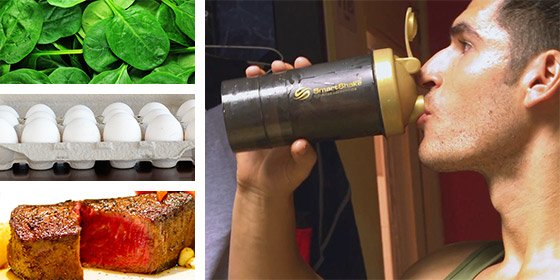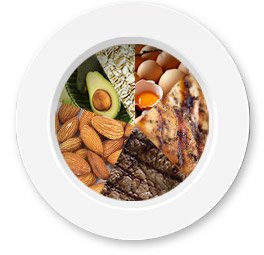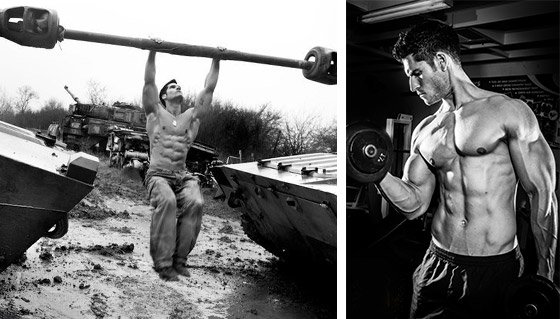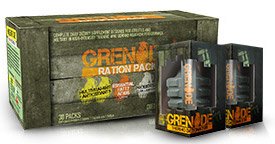The Battle of the Bulge took place in northern Europe against the Germans starting in 1944, but for many overweight individuals it's a battle that's fought every day. This war is being fought against sugar-spiked treats, fatty snacks, inactivity, and highly processed foods, and it's fought not just in days and weeks but in months and years.
Waging—and winning—the war against body fat means finding a nutrition plan you can stick with, so it must be one you also enjoy. Exercise and overall activity play major roles, too. Ultimately, to win the battle you need to tip the scales in your favor: You must burn slightly more calories each day than you consume.
I consulted with former British Army soldier Jamie Alderton, 29, who now combats a different kind of threat as a body-transformation coach and Grenade-sponsored athlete. Here Jamie offers these key weapons you can use in your battle against fat.
Our readers have fought this battle before with some success, and want to finally win it for good. Let's start with nutrition. What are the most important factors when following a calorie-restricted diet?
It's necessary to create a calorie deficit, and you can't do that without knowing how many calories you're eating. Logging your calories will help you determine what you're putting into your mouth. What you eat is the single most important determining factor as to how successful you'll be with your fat-loss efforts.
The most important factor is to create a caloric deficit when trying to drop body fat. What's critical in my eyes is giving the client as much food as possible while trying to drop that weight. Some people go to extremes with their calorie restriction. Although it might seem like they're getting results fast, the reality is that this method is not only unsustainable but highly unlikely to work long term.

What kind of macronutrient ratios do you recommend for fat loss?
Too many clients are unaware of their intakes. Usually, when they think they're eating healthfully, it's because they're selecting the right foods, but there's a strong possibility of overeating or undereating for their goals.
Most of my clients are new both to resistance training and maintaining a good nutritional regimen. For many of them it's necessary to start out with a maintenance level of calories to see how they respond. In this case the macros look like this:

- Protein: 1.2 grams per pound of lean body mass daily (this requires you to approximate your level of body fat so you know your lean body mass). That helps provide the building blocks for protein synthesis and helps maintain muscle tissue on a calorie-reduction plan.
- Dietary Fat: 0.5-0.7 gram per pound of bodyweight daily, especially healthy fats.
- The remainder of the calories are made up from carbs, which will either remain constant or cycled.
I think too much is made of differentiating between good and bad carbs like brown and white rice; after all, when white rice is eaten with other foods, digestion is slowed and the resulting spike in insulin is moderated. Hence I think dieting is made more complicated than it needs to be.
I suggest that you follow a plan in which 80 percent of the foods you eat come from good, clean, healthy sources; another 10 percent from foods you might not like but know are good for you; and the last 10 percent from foods of your choice—cheat foods, if you will. This 10 percent calorie window allows you to enjoy a nice meal out with a friend or a loved one without too much worry.
Can carb cycling help with fat loss?
When trying to increase fat loss, carb cycling—cutting way back on some days, eating your normal amount on others—can help prevent a fat-loss plateau and maintain your metabolism along with workout performance.
How do you make lasting changes when it comes to choosing the right kinds of foods?
What's ultimately important is that each person, especially a noncompetitor, aims to improve their relationship with food. Selecting the right foods needs to become more natural; it can't be seen as this restrictive, never-ending dietary process. Overly restricting someone's food choices can start to play with their head, leading to failure.

Do supplements play a greater role when someone is dieting?
Supplements can play a significant role in a body transformation when used in conjunction with a strong nutrition and training program. It's easy to come up short with macronutrients, so a multivitamin/mineral is key insurance here. Essential fatty acids in fish oils are not only good for the heart, but also have been shown to play a role in fat loss. With Grenade's Ration Pack you also get added antioxidant protection as well as a probiotic, which aids digestion.
Increasing your protein intake is especially important when dieting because with a calorie deficit you're more inclined to resort to breaking down muscle for energy. Grenade's Hydra 6 is a 50/50 blend of whey protein isolate, which digests quickly and rapidly increases protein synthesis, and casein, which digests more slowly and prevents protein breakdown. Studies have shown that this combination is more effective at boosting protein synthesis that either protein alone.
The battle of the bulge is not fought in the kitchen alone. What are the most important training factors to consider when trying to lean out?
Resistance training is important for building or maintaining muscle tissue. Of course, where you start and what you do depends on your current state and your goals. Personally I like to rotate among three weeklong programs with my clients. The idea being, when you do the program the next time around, you're a little stronger and can push a little more weight. Programs can include anything from 5x5 to dropsets to supersets and aren't necessarily meant to be high rep/minimal rest workouts. They're designed, however, to push you, increase muscle mass, and be progressive in nature—you should be able to push more weight the next time through. Seeing gains week over week is a strong motivator to keep progressing ever further.

Many individuals think you should lift with light weights for high reps to lose body fat? Is that correct?
When on a competition-prep diet, I try and lift as heavy as possible and really focus on trying to maintain and increase strength throughout. Tension, intensity, and progression are three of the most important factors when trying to build muscle and drop body fat. I also tend to mix up my training, but volume is normally a crucial part of my program. Make sure you do enough total sets, which is conducive to both hypertrophy (building muscle) and burning total calories.
What are the best exercises for speeding fat loss?
The same ones you follow for muscle gains! It's important to concentrate on your compounds, so choose multijoint movements all the way! I'll always get a client to focus on getting better on the big three—deadlift, squat, bench—before looking to increase strength on accessory exercises.
What other training variables are important to consider?
Many people mistakenly think a fast workout in which rest periods are very short is the best way to lose fat. But the working muscles will not be sufficiently recovered between sets if you're following a body-part workout, meaning you'll sacrifice the amount of weight you can lift. Highly trained individuals may be able to complete faster workouts, but for others it would be a mistake that sacrifices gains in muscle tissue.
How important is cardio in the fat-loss equation?

For burning fat, I don't think cardio is as important as nutrition and training in terms of burning fat, but I think it's especially useful for allowing individuals to eat more foods without adding body fat.
For someone like me who rises early every day, I prefer a low-intensity 60-70-minute walk because it burns calories and relieves stress, especially when listening to my favorite podcasts. Fortunately I live near the beach; I would never recommend this to someone who can do it only on a machine staring at a wall. The benefit is that I can burn off a ton of calories and not be interrupted by emails or social media.
Personally I'll also chuck some high-intensity interval training (HIIT) sessions in there too, as I enjoy them.
For those who struggle with motivation following a diet-and-training program, can you offer any suggestions?
You'll be more driven to succeed if you have an end goal than if you don't, be it a photo shoot or an occasion you want to look good for. That's why so many people succeed by following transformation contests. By all means set a date and follow a program that requires you to follow strict guidelines for diet, training, and cardio. I have several on my website, and there are others on the Bodybuilding.com website as well. While none of these programs may be customized precisely for you, they include daily trainers telling you precisely what to do each day—a great source of motivation.
Keeping your food sources varied and adding a little of what you like and enjoy helps too. The more you know about nutrition and macros the easier it'll be because you can tweak, change, and manipulate a plan to always be enjoyable and progressive.


